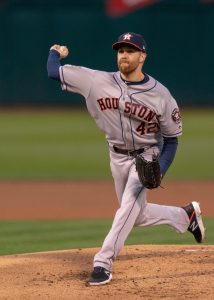Kris Bryant’s service-time grievance became one of the offseason’s longest-running subplots, both because of the unexpectedly lengthy amount of time it took for the final ruling to be announced, and because of the perception that this extended wait may have impacted the Cubs’ efforts to trade the former NL MVP. Arbitrator Mark Irvings eventually ruled in favor of the Cubs, which kept Bryant under team control through the 2021 season rather than only the 2020 season, though the specific arguments behind Irvings’ decision weren’t known until Tuesday, when the Associated Press obtained a copy of Irvings’ 42-page ruling.
The Cubs kept Bryant in the minor leagues to begin the 2015 season, arguing that the then-prospect still had to work on his defense in preparation for his eventual MLB debut. Bryant was called up on April 17, a day after he would have gathered enough service time to become a free agent after the 2020 season. Instead, the Cubs gained a seventh year of control over Bryant, who earned a fourth arbitration year as a Super Two player but still couldn’t hit the open market until after the 2021 campaign.
It was widely expected that the Cubs would win the case, and indeed, Irvings ultimately felt “the [MLBPA] could not satisfy its burden of proving that the Cubs’ assignments of Bryant were done in bad faith to mask service time manipulation.” Irvings cited Bryant’s three errors during Spring Training 2015 as plausible evidence that his glovework was a concern for the team, and the specific timing of Bryant’s call-up coincided with injuries to regular third basemen Tommy La Stella and Mike Olt earlier in the week. Also, Irvings noted that Theo Epstein’s front offices in both Boston and Chicago didn’t place rookies on the Opening Day roster as a general rule, so it wasn’t as if keeping Bryant in the minors departed from Epstein’s established norm.
Irvings specified that his ruling applied only to Bryant’s case, and that “this decision does not address, the global issue of whether clubs have the right to manage service time to delay a player’s achievement of the service benchmarks for salary arbitration and free agent eligibility.” Bryant’s grievance is the most high-profile instance of a player challenging the increasingly common practice of star prospects being kept in the minors for (unstated) service-time reasons, yet it isn’t likely that this practice will be formally dealt with in any way until the new Collective Bargaining Agreement is negotiated between the league and the MLBPA.
As one might expect, Bryant sees early-career status as one of the key issues of the coming CBA talks. “I think we need to look at how early in your career you provide so much value to a team, and you’re a significantly huge bargain,” Bryant told USA Today’s Bob Nightengale. “And then when it’s your turn to fight for your value, people only want to see what you’ve done recently. I just feel like we should definitely change that structure where you’re paid earlier on, and are quicker to arbitration and free agency, stuff like that. Certain things we should totally fight for.”
Bryant gave his take on a number of current topics surrounding the game during the Q&A, including his thoughts on the Astros’ sign-stealing scandal, his positive feelings about the new three-batter minimum rule for relievers, and his more measured view of other proposals (i.e. an expanded playoff structure, automatically placing a runner at second base during extra innings). While Epstein and Bryant recently had a meeting that left the third baseman feeling that he’ll remain with the Cubs at least through the 2020 season, he told Nightengale that was “over” worrying about trade speculation since “I don’t have any control over it, so what are you going to do?”
That said, it is perhaps telling that when asked about getting no-trade protection in his next contract, Bryant said, “I think that might be the most important thing to me. It just gives you clarity in where you’ll be. If you have that in your contract, you know the team’s 100% committed to you being there. You’re their guy. It’s never in your mind about being traded. That’s definitely a very comforting feeling.”
